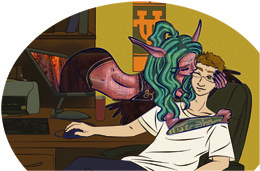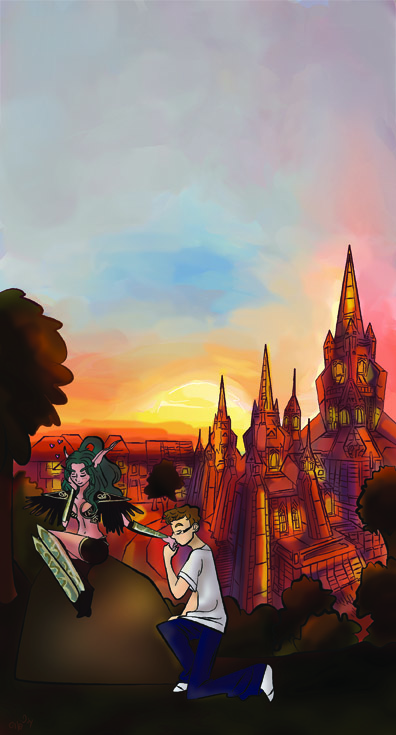WoW the Dating Game
WoW gamers find true love and kick Alliance Ass
By Becky Wreski

Once upon a time, a heavily-armoured, red-haired Troll named Vrai met an emaciated Undead named Shirasabro. They talked about their likes and dislikes — namely killing members of the Alliance and avoiding their homework.
Okay, so maybe this Hunter and Death Knight didn’t have homework, but their human alter egos certainly did. Even though Vrai and Shriasbro exist only in the World of Warcraft, their characters helped unite two real human beings who are physically hundreds of miles apart.
World of Warcraft, commonly referred to as WoW, is a computer game connecting players from around the world through a fantasy realm, making the transformation from bona fide human to fictional Guild member unnaturally fluid. WoW and other similar role-playing games lend themselves to a high-level interaction on both a real and fictional level with other players — on the other side of the couch or thousands of miles away. When fighting monsters and demons until the early morning, bound to make a connection.
That’s exactly what happened to 19-year-old Taylor Baker. The sophomore drama major, who spends over 20 hours a week playing WoW in her Winding Ridge apartment, sets specific gaming times for each day. She plays with other Guild members every Monday through Thursday from 7 p.m. to 11 p.m. and extends her hours on the weekends when she has more free time. These hours are an upgrade — or rather, a downgrade — from her freshman year and her life before gaming.
Katie Yates, a current sophomore at Wells College in Aurora, N.Y, is one of Baker’s former friends. “In high school, I remember that she was always game to do whatever,” she said. Some people change when they go to college, but Yates noticed significant changes in her friend’s behavior.
Baker entered college like a typical freshman, making friends on her floor and going to parties. But as WoW became a bigger priority, Baker fraternized more with fictional friends than with frat boys. More often than not, Baker stayed in to game with her new “close friends,” most of whom she had never met in person, removing herself from her friends, good grades, and real life. “Now when I talk to, her she just seems completely uninterested,” Yates said. “She’s usually at the computer.”

As virtual relationships grow, more and more people are struggling to sustain real-life relationships, according to CNN. Libby Smith, a trainer at the Illinois Institute for Addiction Recovery, said that symptoms of frequent online gaming include anxiety, depression, and low self-esteem; Baker however, nonchalantly chalks it up to losing touch. “It doesn’t really bother me that I don’t have super-close friends,” she said.
On the surface, Yates understands Baker’s point. “[Gaming] can be entertaining, but it can also drain you of your life,” she said.
“Without seeing each other all the time or being together, we just grew apart,” Baker retorted.
But Baker is involved in her second relationship with a guy she has never physically seen or met in the 10 months they have been together. Her first relationship was early in her gaming experience with a man named Jeremy Jennings, then 25 and living in Florida. He visited Baker in Syracuse once while they were dating — the only time they met face to face — but the relationship fizzled after three months.
Baker met her current boyfriend, 19-year-old Brandon Frazier from Arlington, Texas, while adventuring in the magical world of Azeroth. Frazier is currently earning his high school degree and hopes to move to Syracuse to become a cop and to be closer to Baker.
Their relationship blossomed through rich conversation, not from the actual game itself, Baker and Frazier agreed. “It’s not like we started playing the game to find each other,” Frazier said. “I don’t see how that’s any different from going to a party and finding someone.”
It’s true that interacting through online gaming communities share some commonalities with face-to-face interaction. However, according to ScienceDaily.com, forming relationships online creates perceptions about people that gamers cannot necessarily verify, such as translating emotions. This is Frazier’s biggest challenge in their remote relationship.
“I base a lot of my actions off gestures,” he said. “At times, it’s just impossible to tell what [Baker is] really thinking.”
Their relationship, like any nontraditional one, has its fair share of issues. Baker’s parents don’t approve of their relationship, and have blocked Frazier’s number from their daughter’s phone to cut off communication. Baker never expected to find a love interest while gaming; she actually thinks it’s weird to look for an online relationship. A slew of dating sites help gamers seek out a cyberspace connection, such as DateCraft.com and GamingPassions.com. The latter boasts the tagline: “meet other video game lovers who ‘get it’.”
But Baker is skeptical. “I think that if you really want to be in a relationship, you should go out and meet people,” she said. “I see the WoW situation differently because that’s not what I was looking for. It just sort of happened.”
Baker’s reality comes with a “don’t knock it ‘til you’ve tried it” mentality. “I can see where people would think it’s not as real,” she said. “But at the same time, those are people who don’t game. They don’t understand how immersed you can get in it and how much you can actually learn about someone.”
Frazier was also supportive. “Sure, our relationship might not be normal,” he said. “But I love Taylor. She means the world to me, and I couldn’t imagine a day without her.”
Illustrations by Keisha Cedeno
